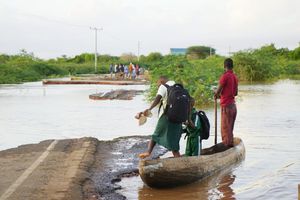Global leaders commit over Sh315 billion to end polio

Vials of the polio vaccine being used during an earlier polio vaccination programme.
Global leaders have committed over Sh315 billion (USD2.6 billion) to support worldwide initiatives eradicate polio.
The money, through the Global Polio Eradication Initiative 2022–2026 Strategy, will support the vaccination of 370 million kids annually for the next five years and to keep polio disease surveillance active in 50 nations.
“No place is safe until polio has been eradicated everywhere. As long as the virus still exists somewhere in the world, it can spread. We now have a realistic chance to eradicate polio completely, and we want to jointly seize that chance," said Svenja Schulze, Germany’s Federal Minister for Economic Cooperation and Development, during the World Health Summit held in Berlin.
Wild poliovirus (WPV1) is endemic in just two countries – Pakistan and Afghanistan.
However, after just six cases were recorded in 2021, 29 cases have been recorded so far this year, including a small number of new detections in southeast Africa linked to a strain originating in Pakistan.
In February, Kenya was on high alert after a polio case was detected in a child in Lilongwe, Malawi. The World Health Organization (WHO) said the case is the first WPV1 in Africa in more than five years. Malawi last recorded a case of wild poliovirus in 1992.
Laboratory analysis shows that the strain detected in Malawi is linked to the one circulating in Sindh Province in Pakistan since October 2019.
Africa was declared free of wild polio in August 2020, and WHO said the new case did not affect that status. Kenya has not reported any cases of WPV1 since 2014.
Additionally, outbreaks of cVDPV, variants of the poliovirus that can emerge in places where not enough people have been immunized, continue to spread across parts of Africa, Asia, and Europe, with new outbreaks detected in the United States, Israel, and the United Kingdom in recent months.
"The new detections of polio this year in previously polio-free countries are a stark reminder that if we do not deliver our goal of ending polio everywhere, it may resurge globally," said Dr. Tedros Adhanom Ghebreyesus, WHO Director-General.
“We are grateful for donors' new and continued support for eradication, but there is further work to do to fully fund the 2022-2026 Strategy. We must remember the significant challenges we have overcome to get this far against polio, stay the course and finish the job once and for all.”
The Berlin pledge event represented the first significant chance to commit funds toward the US$ 4.8 billion required to implement the 2022–2026 Strategy properly.
Compared to the cost of managing outbreaks, it is predicted that the Strategy, if fully financed and successful, will save US$ 33.1 billion in health costs this century.
Additionally, continuing financing for GPEI will make it possible to provide underprivileged populations with various health services and vaccinations in addition to polio vaccines.
“Children deserve to live in a polio-free world, but as we have seen this year with painful clarity, until we reach every community and vaccinate every child, the threat of polio will persist. UNICEF is grateful for the generosity of our donors and the pledges made today, which will help us finish the job of eradicating polio. When we invest in immunization and health systems, we are investing in a safer, healthier future for everyone, everywhere," said UNICEF Executive Director Catherine Russell.
In addition to the funding for GPEI that was revealed today, over 3000 prominent scientists, doctors, and public health experts from around the world issued a statement affirming the 2022–2026 Strategy and urging donors to continue their commitment to eradication and guarantee GPEI's total funding.
The group cites innovative program strategies, such as the ongoing distribution of the novel oral polio vaccine type 2 (nOPV2), as reasons for its optimism in GPEI's capacity to eradicate polio.
Five hundred million doses of nOPV2 have already been administered across 23 countries, and field data continue to show its promise as a tool to more sustainably stop outbreaks of type 2 cVDPV.





